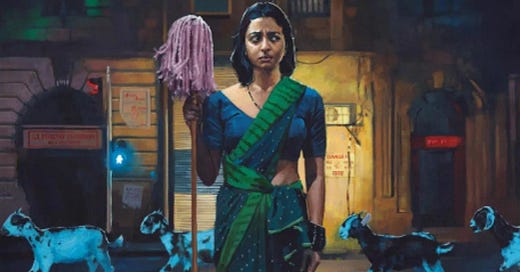Sister Midnight
British Indian filmmaker Karan Kandhari’s directorial debut didn't resonate with critic Alec Toombs, but it could be a cult curio in the making.
Film Yap is a reader-supported publication. To receive new posts and support my work please consider becoming a free or paid subscriber.
I’d heard a lot of good things about British Indian filmmaker Karan Kandhari’s directorial debut “Sister Midnight” (in limited release beginning Friday, May 30 including Indianapolis-area locations Living Room Theaters and Regal Village Park) and dug the picture’s “Taxi Driver”-inspired poster, but the final product didn’t resonate with me as much as I’d hoped.
Mumbai-based Uma (a winning Radhika Apte) and Gopal (Ashok Pathak, coming across like an Indian Michael Peña) enter into an arranged marriage at the behest of their parents. There isn’t any chemistry or love between the two and they struggle to even maintain a friendship. Gopal generally goes to work and gets drunk by himself afterwards leaving Uma as a hostage within their humble hovel.
Uma, lonely and inexperienced at cooking or keeping house, seeks advice and friendship from her next door neighbor Sheetal (Chhaya Kadam). Sheetal, unlike Uma, has love for her husband Sanjay (Chaitanya Solankar) and passes her culinary knowledge on to the new bride.
New companionship and skills aside, Uma’s still restless. She takes a job as a nighttime janitor in an office building where she befriends elevator operator Sher Singh (Subhash Chandra). This vocation also isn’t enough to fill the void and Uma begins engaging in abhorrent behaviors that are best left undisclosed and discovered by the viewer.
There’s a lot about “Sister Midnight” that I admired. Apte does great and interesting work that makes an unappealing character as appealing as they can possibly be. It also has a killer soundtrack consisting of various tunes from Cambodian singer-songwriter Sinn Sisamouth as well as diverse cuts from American and English artists such as Howlin’ Wolf, The Band, Buddy Holly, the Stooges, Blind Willie Johnson, Marty Robbins, Motörhead and T. Rex.
Comparisons will be drawn between “Sister Midnight” and the works of Jim Jarmusch and Wes Anderson and I can certainly see them, but Kandhari’s voice is understandably not as established as theirs. Kandhari shows enough promise as a filmmaker that I’d be curious to check out whatever he does next. I just found this exercise to be too repetitive early and too outrageous late. There’s an audience for this film – it wouldn’t surprise me in the slightest if it establishes a cult following – it just ain’t me. I dig the feminist and punk rock messaging – I just don’t dig the way in which it’s told.





